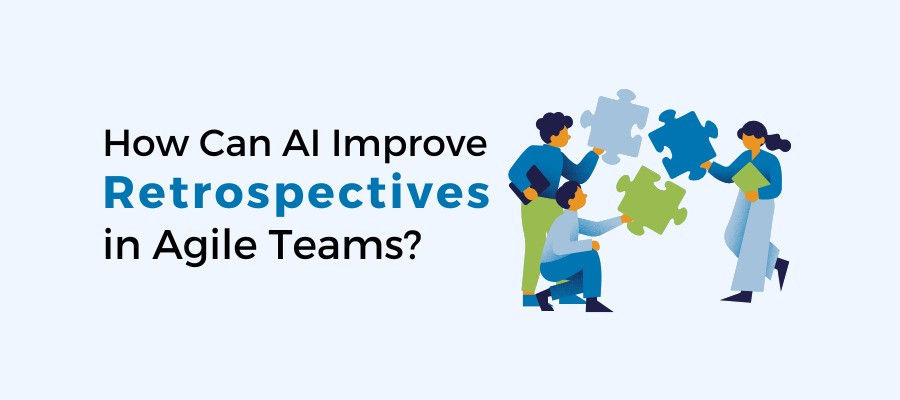How Can AI Improve Retrospectives in Agile Teams?

Sprint retrospectives give agile teams a dedicated space to reflect on the past sprint and identify ways to improve. However, let’s face it! Retrospectives can sometimes feel repetitive, lose focus, or fail to bring actionable insights.
As a Scrum Master, you can run better retrospectives if you embrace Artificial Intelligence! With its ability to analyze data, identify patterns, and generate creative ideas, AI can transform retrospectives into more engaging, insightful, and impactful sessions. Let’s explore why smooth retrospectives matter and how AI can enhance them.
Why Scrum Masters Must Facilitate Smooth Retrospectives?
Retrospectives are more than just meetings—they’re a cornerstone of Agile success. A well-run retrospective keeps teams aligned, fosters collaboration, and helps resolve issues before they escalate.
Here’s why Scrum Masters should prioritize smooth and effective retrospectives:
- Builds trust: Open discussions during retrospectives strengthen team dynamics and create a culture of trust.
- Drives innovation: Retrospectives encourage teams to think creatively about solutions and continuously improve processes.
- Prevents burnout: Identifying and addressing team pain points early prevents long-term dissatisfaction.
- Boosts performance: Actionable insights from retrospectives lead to better decision-making and smoother sprints.
However, facilitating a successful retrospective isn’t always straightforward. Teams may struggle to open up, focus on the correct issues, or turn feedback into actionable outcomes. This is where AI tools can make a significant difference.
The Power of AI in Retrospectives
AI brings a wealth of possibilities to retrospectives, helping Scrum Masters overcome common challenges and unlock deeper insights. Here’s how:
1. Automating Data Collection and Analysis
Scrum Masters often gather data from sprint boards, performance metrics, and feedback forms before retrospectives. AI simplifies this process by automating data collection and presenting actionable insights.
Tools like Jira Align and ClickUp use AI to analyze sprint performance, highlighting patterns such as recurring delays or bottlenecks. These insights enable the team to focus discussions on high-impact areas.
Benefit: Time saved on manual analysis allows Scrum Masters to concentrate on facilitating meaningful conversations.
2. Identifying Hidden Patterns
AI excels at uncovering trends and correlations that might not be immediately obvious. For instance, sentiment analysis tools can evaluate team morale based on communication patterns in chat tools like Slack or Microsoft Teams.
A tool like MonkeyLearn can analyze team feedback and flag recurring frustrations, such as poor communication or unclear goals.
Benefit: Scrum Masters can proactively address underlying issues, ensuring retrospectives focus on the root causes rather than symptoms.
3. Enriching Brainstorming Sessions
Keeping brainstorming sessions fresh and engaging is critical for effective retrospectives. AI can help by generating unique ideas, prompts, and exercises tailored to the team’s needs.
ChatGPT or Claude can suggest icebreakers, voting techniques, or creative retrospective formats, such as “Mad, Sad, Glad” or “Sailboat.”
Pro Tip: Ask AI tools specific questions like:
- “What are five creative ways to structure a retrospective for remote teams?”
- “Generate interactive activities to identify team improvement areas.”
4. Enhancing Collaboration in Distributed Teams
Maintaining engagement during retrospectives can be challenging for teams spread across time zones. AI-powered tools streamline collaboration by creating inclusive environments.
Tools like Miro and MURAL integrate AI features to make virtual retrospectives interactive, such as clustering similar feedback or summarizing discussions in real time.
Benefit: Distributed teams stay aligned, and everyone’s voice is heard, regardless of location.
5. Tracking and Following Up on Action Items
One of the most critical outcomes of any retrospective is the list of action items the team agrees to implement. AI ensures these don’t fall through the cracks.
Example: Tools like Trello and Asana use AI to:
- Assign action items to team members automatically.
- Send reminders about deadlines.
- Track progress and flag incomplete tasks.
Benefit: Teams stay accountable, and retrospectives lead to measurable improvements.
Making Retrospectives Impactful With AI
Imagine this scenario: You’re a Scrum Master preparing for a retrospective. Instead of spending hours gathering data and brainstorming ideas, you use an AI tool to:
1. Generate a customized retrospective agenda.
2. Present a visual summary of the sprint’s successes and challenges.
3. Propose actionable insights and discussion prompts.
During the session, an AI-powered tool facilitates brainstorming by clustering similar ideas and identifying recurring themes. Afterward, another AI tool sends a summary and tracks progress on action items.
The result? A retrospective that is efficient, engaging, and truly impactful.
It’s Time To Elevate Your Role as a Scrum Master
Retrospectives are where teams reflect, improve, and align, making them a cornerstone of Agile success. With AI, Scrum Masters can take retrospectives to the next level—unlocking deeper insights, fostering collaboration, and driving meaningful change.
If you’re a Scrum Master looking to enhance your skills and integrate cutting-edge tools like AI into your practices, consider becoming a Certified Scrum Master (CSM) with PremierAgile. Their training programs not only prepare you for certification but also equip you with practical strategies to lead with confidence and innovation.
Start your journey toward mastering Agile and harnessing the power of AI in retrospectives today. Transform your team rituals and make every sprint better than the last!
Reference:
https://resources.scrumalliance.org/Article/enhance-work-scrum-master-ai-powered-tools




